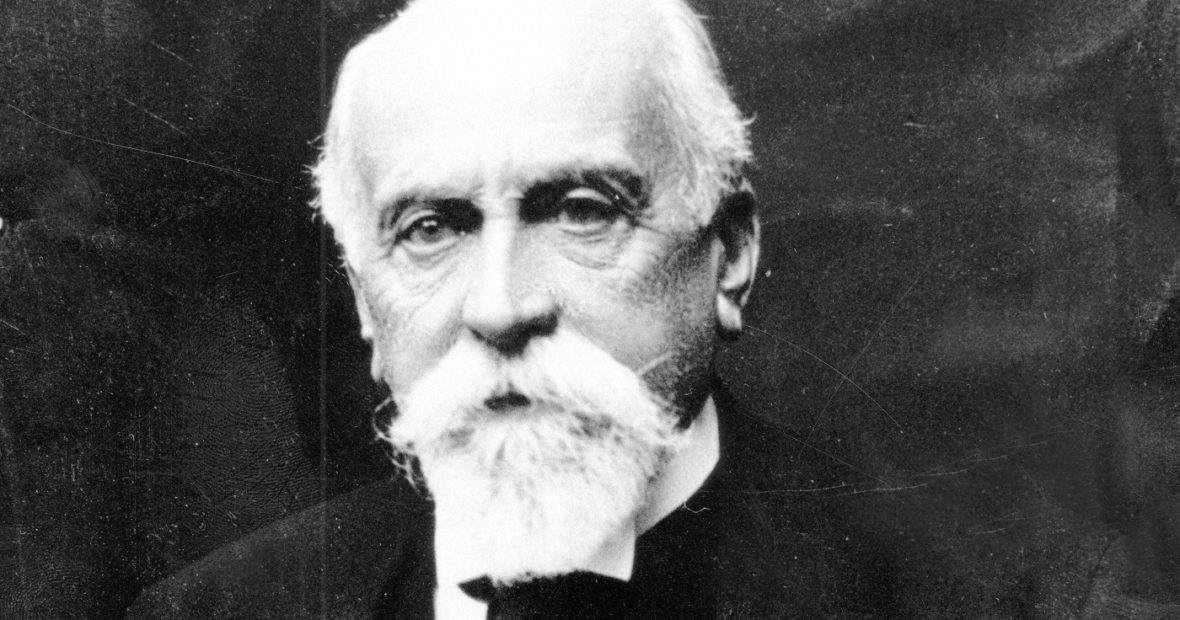Just as refugees are not new, neither are the efforts of non-governmental humanitarian organizations that assist them. A myriad of agencies now engage in helping forced migrants around the globe. These organizations are best known for providing emergency relief and finding livelihoods and permanent homes for refugees and displaced people. Yet, their role and importance are not purely humanitarian in nature. In the past, they have demonstrated significant leadership on migration policy issues.
The role of the ICRC in response to the Russian refugee crisis of the 1920s is an early example of this leadership. In this case, the ICRC, in collaboration with other non-governmental humanitarian actors, exercised leadership in three primary ways: helping to set the political agenda, defining the human security needs of refugees and facilitating cooperation within international organizations.
Gustave Ador, the ICRC and setting the agenda
In early 1921, at least one million Russian refugees escaped war and political violence, fleeing to the fringes of the former Tsarist Empire. These men, women and children lived on the margins of society, dependent on their own dwindling resources and handouts from local aid committees. Moreover, they lacked formal legal status, and as a result, could not cross international borders legally, secure gainful employment or access many government services.
Addressing members of the League of Nations in February 1921, the President of the ICRC, Gustave Ador, urged the Council to appoint a commissioner to deal with the thousands of Russian refugees then spread out across Europe. He called the League the ‘only supernational political authority capable of solving a problem which is beyond the power of purely humanitarian organisations’. In making this bold proposal, Ador, a well-known Swiss politician, called refugee assistance both ‘a humanitarian duty’ and an ‘obligation of international justice’. Inspired by the success of international collaboration to assist prisoners-of-war during the First World War, Ador believed that similar efforts could diminish refugee problems. (League of Nations, Official Journal, March-April 1921, p. 227)
In making this proposal, Ador and the ICRC challenged the common perceptions held by both government officials and their publics that responsibility for helping refugees did not rest with society as a whole. The underlying assumption of the Great Powers was that particular refugee groups ‘belonged’ to them, while others did not. The British, for instance, had helped evacuate ‘their’ refugees to Egypt and Greece, while the French government supplied the remnants of General Wrangel’s army whose members had fled to Constantinople (Istanbul). In each of these locations, refugees lived in harsh, insecure, and unsustainable conditions. As time passed, it became clearer that return to their homes in what was now the Soviet Union would not be likely in the near future. Moreover, the American Red Cross, which initially played an important role in providing food and supplies, could not continue to do so indefinitely.
The refugee assistance proposal made by Ador and the ICRC initially generated only a luke-warm response. Although the French government supported the proposal, others did not. The British officials, in particular, were reluctant to move from a purely private charity model of aid delivery for refugees, fearful that governmental action would diminish private charity. In a second memorandum to the Council of the League of Nations, dated 20 February 1921, Ador insisted on a different approach. Though he praised the relief efforts of the American Red Cross, the French and Italian Red Cross Societies and the Save the Children Fund, he argued that relief agencies, ‘powerful though they be, are coming more and more to see that their work does not suffice’, to meet the needs of refugees. (League of Nations, Official Journal, March-April 1921, p. 227)
Despite obstacles, Ador and the ICRC did secure the attention of governments, and consequently their proposal was sent to the Secretariat of the League of Nations for further study and possible endorsement.
Defining the human security needs of refugees
Once the ICRC succeeded in putting the issue of refugees on the agenda of the League of Nations, they also helped define how the fledgling intergovernmental organization responded to their needs. While the first impulse of many governments was too narrowly define ‘the refugee problem’, as a purely legal one, the ICRC and other humanitarian agencies tried to broaden the discussion about the human security to include material needs, employment, education, physical safety and human dignity.
For instance, at the Universal Conference of Red Cross Societies held in March 1921, the ICRC and other humanitarian organizations highlighted the material needs of refugees, especially those of children, a group previously neglected in the political conversation. Building on the valuable work done by the International Save the Children fund, the ICRC developed a feeding program for needy refugee children in Turkey, Bulgaria and Yugoslavia. (Letter by Gustave Ador, President of the ICRC, to the Council of the League of Nations, June 15, 1921 [Public Record Office/British Foreign Office/371/6867/172]. By August 1921, this program had supplied food to 11,000 children. (Pre-conference memo on Russian Refugees from the Secretary-General to the Council and Members of the League of Nations, August 1921 [PRO/BFO/371/6869/93])
Similarly, the ICRC also helped Russian aid agencies, which had lost their national government champion, to communicate the importance of refugee dignity to the League Council. In June 1921, for instance, the ICRC forwarded a letter from the United Committee of Zemstvos and Russian Towns that called attention to ‘the fate of these unhappy people, deprived of their country, their livelihood, their rights and even of hope’. The letter further stressed the importance of self-help, especially by employment for refugees and education for youth. (LNA/ ‘Russian Refugees’ 1 August 1921, Geneva C 126(a), 1921.VII [PRO/BFO/371/6868/236].
In regard to physical security, the ICRC staked out a position that was designed to put limits on governmental action, specifically with respect to the controversial return of refugees to their homeland. While some argued for the immediate repatriation of Russia refugees in order to reduce relief roles, the ICRC stressed that return should not take place unless the refugees could ‘be given assurances of the most elementary security’. (Ador to Council, June 15, 1921, [PRO/BFO/371/6867/174])
An exercise in leadership
In addition to defining the human security needs of refugees, the ICRC also exercised leadership by promoting intergovernmental cooperation. In the summer of 1921, ICRC representatives lobbied the main refugee host governments of Europe, pressing for a more centralized policy approach. Finally, under growing pressure from host governments, in August 1921 the League of Nations convened an inter-governmental conference on refugees. Delegates from ten countries attended, as did representatives of the International Labor Organization (ILO), the ICRC, the League of Red Cross Societies and the Save the Children Fund. As a result of the conference, the Council took the bold step of creating a high commissioner for refugees, eventually appointing Fridtjof Nansen to that position. Under Nansen’s leadership, the refugee agencies of the League of Nations created the Nansen passport system to facilitate the movement of refugees, and later joined with the ILO in order to organize refugee employment.
While the work of Nansen as High Commissioner is well known, what is less well known is the behind the scenes role that Gustave Ador, the ICRC and the voluntary agencies of the day played in driving intergovernmental cooperation on behalf of refugees. Although they lacked traditional sources of power, such as military capability or control of strategic resources, they combined moral authority with administrative expertise to achieve their goals—in this case, building an international coalition in favour of refugee assistance. As a result, they shaped both humanitarian discussions and policy in the past, and serve as an example for those who now try to do so. Without the leadership of Gustave Ador and the ICRC, the history of the first internationally organized efforts to assist refugees would have been quite different, and perhaps might not have happened at all.
***
Claudena M. Skran is Professor of Government and Edwin and Ruth West Professor of Economics and Society at Lawrence University in the United States. Dr. Skran earned her D. Phil in International Relations at Oxford University and is the author of Refugees in Interwar Europe: the Emergence of a Regime. A specialist on international organizations that assist, Dr. Skran has also been a fellow at the U.S. Institute for Peace, a Fulbright Research Scholar in Sierra Leone (2005-06), and a consultant for the UNHCR.
***
Resources:
- Sir Michael Aaronson, Refugees, migrants, IDPs: Protecting people on the move – without distinction, October 9, 2017
- ICRC, How does IHL protect refugees and internally displaced person? August 14, 2017
- Conference Report, Forced to flee: A multi-disciplinary conference on internal displacement, migration and refugee crises, International Review of the Red Cross, 2017
NOTE: Posts and discussion on the Humanitarian Law & Policy blog may not be interpreted as positioning the ICRC in any way, nor does the blog’s content amount to formal policy or doctrine, unless specifically indicated.






Thank you Professor Skran. The dynamics involved in the 1920s in a) encouraging a political agenda, b) ensuring the security conditions are established, and c) gathering together international collaboration to address the issue are very much what is needed to address the unfolding refugee crisis that had seen more than 650,000 flee Myanmar since Aug17. But a deeper dive into that dynamic will allow one to find perhaps a million people have fled and are stateless in Bangladesh today.
I hope I can follow the energetic and highly motivated lead provided by Gustave Ador decades ago to help those in need find dignity and security in their lives…